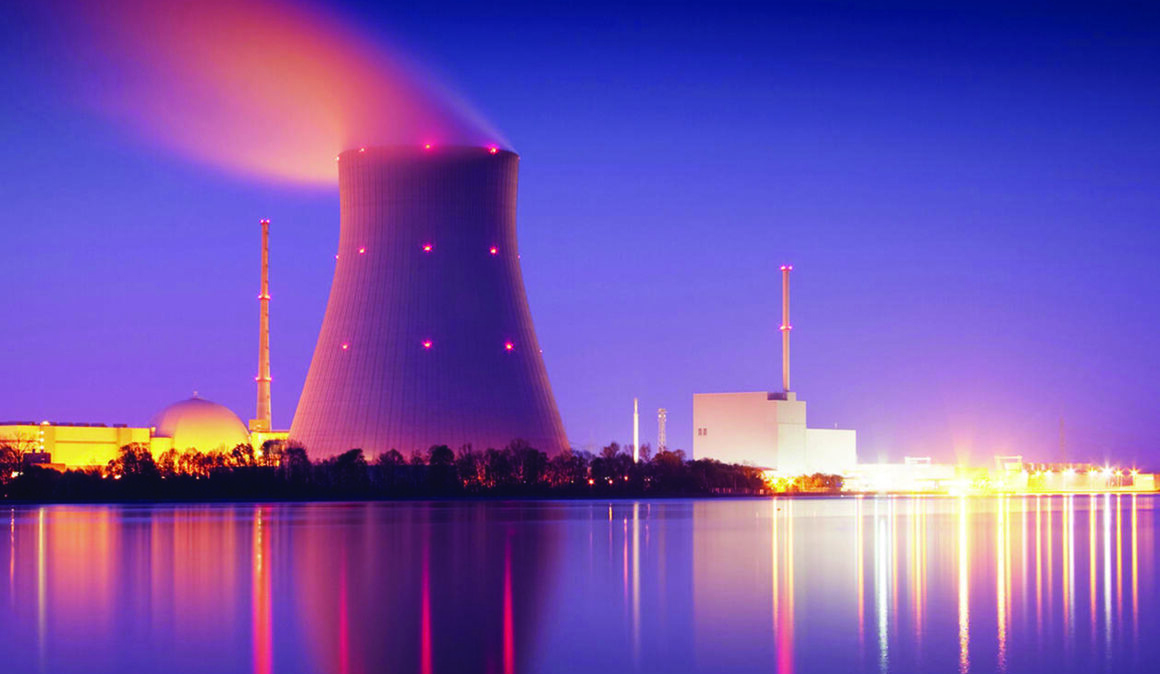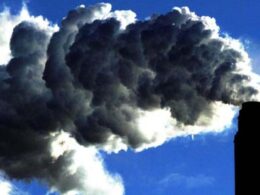With the climate emergency worsening by the day, many are understandably desperate for solutions, and in particular for alternatives to fossil fuels. In this context, the debate about nuclear power is reigniting, with even some on the left advocating for its use. Chris Stewart argues against this mistaken view.
We are in the midst of a deepening climate emergency. It is predicted that in the next few years global average temperatures will reach 1.5 degrees above pre industrial levels – a potentially catastrophic milestone.
The chief reason for this rise is the massive amounts of greenhouse gases pumped into the atmosphere due to the combustion of fossil fuels in capitalist production. Globally, over 80% of capitalism’s massive energy consumption comes from these carbon-heavy sources.
Capitalism is proving itself totally incapable of dealing with this crisis of its own creation. The world’s biggest banks have invested over $3.8 trillion in the fossil fuel industry since the Paris climate deal was struck in 2015, because despite the dangers it remains highly profitable for them to do so.
At the same time, private investment in renewable energy has actually fallen.1 This is because capitalists cannot make as much short-term profit from building renewables as they can from fossil fuels and market speculation. In fact, renewable energy may produce too much energy in order to be profitable for capitalism.
Because renewable energy requires very little labour input compared to fossil fuels, once the infrastructure is constructed renewables promise abundant cheap energy that would lower the price of energy from all sources – meaning reduced profits for capitalists. The better the renewable infrastructure, the worse will be the returns on investment for the capitalist class.2
The technological basis already exists to rewire the world with renewable energy. The only barrier is the capitalist market-system. As long as capitalists can profit in the short-term from fossil fuels no real transition is possible.
Nuclear: no solution to the climate crisis
This is the context in which many billionaires, media outlets and capitalist states have begun to push nuclear fission as a “solution” to the climate crisis.
Fission is a type of nuclear reaction in which the atoms of heavy elements such as uranium are split into smaller atoms, releasing energy in the process that generates electricity. This type of energy creates large quantities of toxic nuclear waste, and has – in the past – led to a number of nuclear disasters such as Three Mile Island (1979), Chernobyl (1986) and Fukushima (2011).
Many capitalist states are investing huge sums in subsidising new so-called “next generation” nuclear reactors, while others are touting experimental “small modular reactors” (SMRs) as a saving grace for the climate. Recently the EU in its draft climate plans has attempted to define both nuclear energy and some forms of natural gas as “sustainable” energy alternatives.
This was met with stiff opposition from scientists and experts in nuclear energy around the world. The former heads of nuclear power regulation in the U.S, Germany, and France, along with the former secretary to the UK’s government radiation protection committee, issued a joint statement in response arguing that “nuclear is just not part of any feasible strategy that could counter climate change”. They wrote:
“The central message, repeated again and again, that a new generation of nuclear will be clean, safe, smart and cheap, is fiction…The reality is nuclear is neither clean, safe, or smart; but a very complex technology with the potential to cause significant harm.”3
Rise of the left atomics
Despite this, even some groups and figures on the left and in the environmental movement have begun to support nuclear energy in recent years, arguing it is a partial solution to the climate crisis. British writer and environmentalist George Monbiot began to support nuclear power in the wake of the Fukushima disaster, arguing that the threat of such disasters was overstated and that nuclear energy “can make a useful contribution to low-carbon energy”.4 Monbiot envisages nuclear power alongside renewable infrastructure as our best bet to end the climate crisis.
Similarly, editor of left-wing magazine Jacobin, Bhaskar Sunkara, wrote in the Guardian in 2021, “if we want to fight the climate crisis, we must embrace nuclear power.”5 Jacobin itself has featured many articles arguing for nuclear energy – particularly in its environmental edition entitled “Earth, Wind and Fire”, in which nuclear power is proposed alongside carbon capture and geo-engineering as technological solutions to the climate crisis.
Such left figures see nuclear energy as a potential reprieve from fossil fuel carbon emissions under capitalism. Jacobin’s “eco-modernist” view optimistically argues that new technological innovations under capitalism will be able to halt emissions and engineer a more stable climate using nuclear energy, even without fundamental system change. But capitalism is already hurtling towards ecological disaster, and it is increasingly clear that the system is incapable of bringing about the kind of transformation of our energy infrastructure that is required.
Millions of young and working-class people around the world are looking for solutions to the climate crisis. As such, billionaires like Bill Gates and Elon Musk push the false solution of nuclear energy to obfuscate the system’s continued inability to transition to a system of renewables. Socialists should not cheerlead this, and should instead call it out for what it is – a diversionary tactic that only threatens to deepen capitalism’s ecological crisis.
Why nuclear won’t save us
Nuclear power is not a sustainable source of energy. Production of nuclear energy relies on a constant supply of uranium and other radioactive material, of which there are limited supplies on Earth. It is estimated that the kind of considerable increase in nuclear energy production that is proposed by nuclear advocates would mean the Earth would run out of stocks of uranium within a few decades.6 This means that nuclear energy can never be a long-term solution to meeting humanity’s energy needs.
In addition to this, it takes on average 15 years to set up new nuclear reactors, and often they are plagued with technical problems that result in less energy being produced than previously thought. The life-span of these plants averages a few decades at most, and decommissioning them is a long, costly and resource-intensive process.
We have no time to lose if we are to stop the worst effects of runaway climate change, spending years building up nuclear power would be a waste of time, energy and human labour that would create long-term dependencies and will not get us any further in stopping the ecological crisis. In fact, nuclear power comes with many ecological problems itself.
The ecological dangers of nuclear power
The entire lifespan of nuclear power generation comes with a significant carbon cost. Studies show that nuclear energy emits considerably more carbon per kilowatt hour than renewables do (88-146 grams per KWh for nuclear, compared to 5-12 grams for wind power).7 This is an important consideration as we must limit carbon emissions as much as possible if we are to combat this crisis. Nuclear also uses significant amounts of water compared to renewables, a huge problem for a supposedly “sustainable” energy source given the climate-related droughts many parts of the world face.
Mining for uranium is an extremely dangerous and toxic process that often results in the leakage of radioactive material into the environment. This is disastrous for eco-systems and can make nearby groundwater totally unusable forever. This is already a significant problem but will inevitably become much worse if uranium mining is expanded. Uranium mining also exposes workers to unsafe conditions and results in preventable deaths and illnesses.
A 2009 report by the European Commission found that approximately 70% of uranium used in nuclear reactors worldwide is sourced from the homelands of indigenous peoples.8 Expanding nuclear energy production will mean expanding such mining practises, encroaching further into the natural world, contaminating water sources, and dispossessing communities of their land.
For working-class people living near nuclear power plants, as well as the workers employed in the nuclear industry, nuclear energy comes with significant health and safety hazards. Researchers have documented effects of low-level radiation (LLR) from the various stages of nuclear power production. Increases in leukaemia appear in research on over 300,000 nuclear workers in the US, UK and France, and studies show increases in leukaemia in children living close to nuclear power plants.9
This is not to mention the potential for nuclear disasters — such as the Fukushima disaster — that can never be ruled out, even with technological improvements on modern nuclear reactors. Extreme weather events, wars and cost-cutting safety breaches (which are all too common from nuclear corporations) are all possibilities that could spell disaster for people living nearby nuclear power plants.
No solution to nuclear waste
The biggest problem with nuclear energy production is that it produces tonnes of highly radioactive waste that takes thousands of years to decay. Globally there is more than a quarter million metric tons of such waste.10
High-level nuclear waste, which is primarily spent fuel from nuclear reactors or the residues resulting from reprocessing that fuel, can take up to a million years to decay to a point where it is no longer hazardous for humans.
Such a timescale is not only totally impractical from the point of view of human life-spans, but also from the point of view of the Earth. The Earth is a dynamic system which is constantly changing, often in sudden and violent shifts. Burying nuclear waste for such timescales poses the potential for catastrophe due to erosion or unexpected geological phenomena (which are likely over thousands of years).
Not a single country in the world has a facility for long-term storage of this waste, with Finland being the only country (out of 32 countries with nuclear plants) attempting to create one. Some scientists have questioned if such a site will ever be a long-term solution due to long-term natural processes that could threaten its security.
In reality, there is no “solution” to long-term nuclear waste storage. Such waste facilities would require constant monitoring and servicing for thousands and thousands of years. Expanding nuclear energy production necessarily means filling the Earth with radioactive waste, condemning future generations to potential catastrophes.
Replacing our current ecological emergency with the promise of a future one is no solution. Nuclear energy, especially under the control and operation of capitalists, will bring about contamination, potential disasters and the intractable problem of stockpiles of deadly waste, and even with maximum production will not bring about a long-term solution to our energy needs.
An energy system with 100% renewables
Those on the left who present nuclear energy as a part of the solution to this crisis often present it as the “sensible” option, and act as though demanding 100% renewables is “unrealistic”. This is merely accepting the false parameters of the capitalist system, and ignores the reality that nuclear energy cannot feasibly play a role in a transition away from fossil fuels.
These left advocates of nuclear energy do not have confidence that a united struggle of the world working class can end capitalism and lay the basis for a planned, socialist system powered by renewable energy. Instead, they look to false technological solutions as a quick fix under capitalism.
But the reality is there is no purely “technological” solution to this crisis on the basis of this system. The anarchy of the capitalist market-system is utterly incapable of rebuilding our energy system. Capitalism will plunge us into thousands of years of ecological crisis long before it relinquishes its addiction to fossil fuels. If we are to stop this crisis we must overturn this system and build a fundamentally different kind of society.
Ramping up nuclear energy production is a dead-end for planet Earth, especially if left under the control of capitalists. Similarly, the demand for increasing nuclear energy production is a dead-end for the climate movement. It merely serves to sow illusions in the ruling class and their false solutions.
Instead, we should demand an immediate transition to a 100% renewable, publicly-owned energy system. This is achievable on the basis of massive public works programmes aimed at rebuilding our electric grids so that they rely entirely on renewable energy, linked to international projects of supergrid networks with smart grid technology that can integrate vast energy sources.11 These can be built relatively quickly and would create countless jobs all over the world.
Such technologies exist today. However, they will never be utilised in the way they can and need to be as long as capitalism reigns. The cheap energy that is promised by a global system of renewables is a threat to the profits of the energy corporations that have such significant political and economic power under our current system. Capitalists will not invest in widespread renewable infrastructure if they can continue to make more short-term profit in fossil fuels. If we are going to stop this crisis, the climate movement must take on these climate criminals and the system that protects them.
Capitalism is a system based on rival nation-states competing for control of markets. The idea of sharing abundant energy in a rationally planned way between countries is an anathema to the ruling classes of the world, who find themselves locked in ever-rising imperialist tensions. Each nation-state has its own energy companies competing to squeeze as much profit out of the world’s natural resources as possible.
So long as energy is run for profit there can be no real transition. As such, control of energy production and distribution must be taken out of the hands of the corporations that have created this crisis and brought into democratic public ownership. Such an energy system, under the direct control of energy workers and working-class consumers could immediately see to the manufacture, installation and operation of renewable energy systems free from the destructive logic of the market.
In this way, humanity could harness the energy that already exists in abundant quantities on Earth – the power of the sun, the waves, the wind and the geothermal energy in the Earth’s crust itself – ending carbon emissions while massively increasing productivity.
Democratic planning, not capitalist waste
But it is not enough to simply change the source of our energy, we also have to change how energy is consumed. Under capitalism, massive amounts of energy goes to waste in unproductive and harmful activities while millions of people around the world face energy poverty.
One stark example of energy waste resulting from the anarchy of the capitalist market system is the massive amounts of electrical energy used in the totally unproductive activity of bitcoin mining (currently 204.5TWh – on par with Thailand’s electricity consumption). Such waste is only possible under a system in which profit, totally detached from human progress, is the driving force of investment.
If our energy system was under the democratic control and oversight of working-class people, and not left to the whims of the market, this waste could be completely eliminated, freeing up surplus energy to raise people’s standards of living and help meet the decades-long climate related challenges we face. For example, such surplus energy could be put to use in developing carbon capture technology to help remove carbon from the atmosphere.
Under a planned economy, energy could be used more efficiently to meet the needs of people through massive networks of green public transport, energy efficient housing, fully funded healthcare, childcare, education and so on.
If we are to solve this crisis we cannot rely on the false promise of nuclear power. The only solution to this crisis is the immediate transition to 100% renewable energy on the basis of a democratically planned, socialist energy system.
We must be clear that this is only achievable through a working-class struggle against this system and for a socialist future. Only this way can we put an end to the climate catastrophe and create a sustainable system of production that meets the needs of all people.
Notes
1. Simon Edelsten, February 2022, ‘Ask the awkward questions about green investing’, Financial Times, www.ft.com
2. The Economist, February 2017, ‘Clean energy’s dirty secret: Wind and solar power are disrupting electricity systems’, www.economist.org
3. Jessica Corbett, January 2022, ‘Experts Say Nuclear Energy as Climate Solution Is Total ‘Fiction’, Common Dreams
4. George Monbiot, September 2016, ‘Nuclear power – yes please. Hinkley Point – no thanks’, The Guardian, www.theguardian.com
5. Bhaskar Sunkara, June 2021, ‘If we want to fight the climate crisis, we must embrace nuclear power’, The Guardian, www.theguardian.com
6. Lisa Zyga, May 2011, ‘Why nuclear power will never supply the world’s energy needs’, www.physorg.com
7. Jan Willem Storm van Leeuwen, 2017, Climate change and nuclear power: An analysis of nuclear greenhouse gas emissions, www.wiseinternational.org
8. Yvonne Margarula, April 2011, ‘Letter from Gundjeihmi Aboriginal Corporation to UN Secretary General’, www.aph.gov.au
9. Alison Abbott, June 2015, ‘Researchers pin down risks of low-dose radiation’, Nature, www.nature.com
10. Mitch Jacoby, March 2020, ‘As nuclear waste piles up, scientists seek the best long-term storage solutions’, Chemical and Engineering News, www.cen.acs.org
11. Jonathan Neale, 2021, Fight the Fire, Resistance Books











